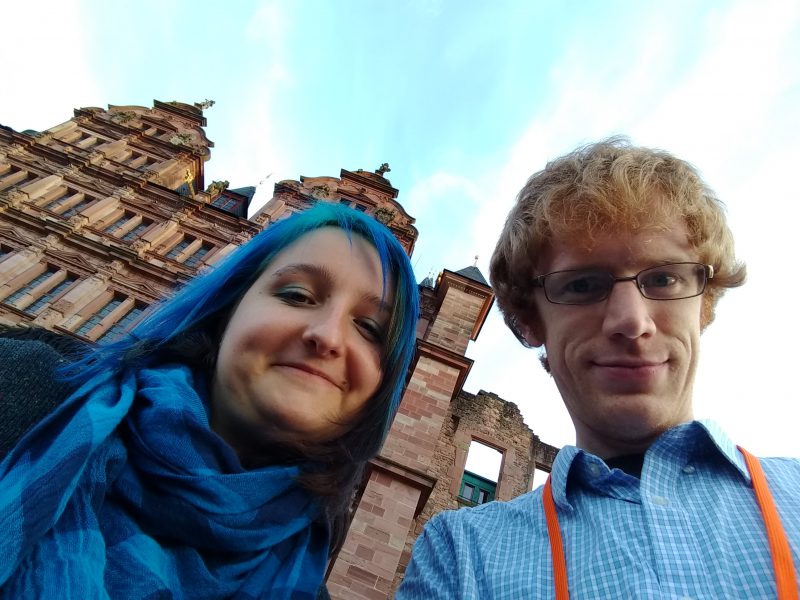We’ve gone crashing into October and that means it’s also #Mathober, an annual maths/art celebration taking place on the internet. If you’re into maths or art, or both, and would like to try producing something creative this month, on an informal schedule, #mathober provides a structure for you to do that.
You're reading: Posts Tagged: maths
- Help support the next generation of Black mathematicians with Mathematically Gifted and Black
- Contribute to the new AMS 2020 Fund which will support and promote the work of Black mathematicians and establish a new fellowship to support the scholarship of Black mathematicians.
- Directly provide #BlackAndSTEM Students with mutual aid (via @jazztronomy)
- Directly aid the member of BlackAfinSTEM, or the group as a whole
- Become a member (or donate to) National Association of Mathematicians
- Contribute to or Sponsor the EDGE (Enhancing Diversity in Graduate Education) Program
- Support the Benjamin Bannecker Association’s mathematics education advocacy work
- Build a new mathematics community with the Math Alliance
- Donate to support TODOs mission of equity and social justice in math education for all
- Sign the Petition to rename the American Statistical Association’s Fisher Lecture After David Blackwell
- Add your name to a letter asking the Mathematical Community to boycott collaboration with police (Letter will be sent to AMS Notices Jun 15)
- Send letters to ICERM about the combination of silence and history promoting predictive policing and AWM about their choice of a predictive policing expert as the 2021 AWM-AMS Emmy Noether Lecturer,
- (This link used to include a template to contact MSRI but MSRI has now published a statement (even if it is not that visible <it is the small black square> on their homepage) and indicated they will be amplifying their African Diaspora Joint Mathematics [ADJOINT] Workshop via @mathmoves and their email newsletters.)
- Support #VanguardSTEM and their Conversations with Women of Color in STEM video series
- Build a more diverse STEM with Society for Advancement of Chicanos/Hispanics and Native Americans in Science
A bit of inspiration from #MathArtMarch
This is a guest post by Elinor, who’s been collecting her favourite maths art from the month of March.
March is a month of change in the UK: the days get longer, the temperature is slowly creeping upwards, and we start to believe that spring may be arriving. Through this month of change I have been really enjoying all the #MathArtMarch posts that have been appearing on Mathstodon and Bluesky.
Interview: Coralie Colmez, author of The Irrational Diary of Clara Valentine
We spoke to Coralie Colmez, mathematician and author of Math on Trial, about her genre-busting new Young Adult novel for mathematically minded teenagers: The Irrational Diary of Clara Valentine.
Maths in the Spiderman: No Way Home Credits
Peter suggested it, so Katie had to do it: here’s a video of Katie and fellow maths/Marvel fan Jimi watching through the end credits to Spiderman: No Way Home (warning: contains spoilers for the film) and talking about the mathematical things found therein.
Mathematical Things To Do

If you find yourself at a loose end this month, want a break from focusing on work, or have younger mathematicians to entertain, here are some suggestions for online activities you can do/watch/attend. If you have any suggestions of your own, add them in the comments!
Resources for Anti-Racism and Social Justice in the Mathematical Sciences

(Author Positionality: I want to start this post by stating I am writing this from my position and lived experience as a white, male-passing queer, non-binary person who has lived their whole life in the United States of America. I am employed full-time as the mathematics & statistics librarian at a large endowment public doctoral granting university in the USA. I do not have to go up for tenure. I am a highly privileged person. I have not been perfect and I have been a part of the problem. I believe anti-racism is the way to no longer be a part of the problem. I believe Black Lives Matter.)
Note: This post will focus on the mathematical sciences within the USA as that is where my lived experience and knowledge lies. Also, this is an evolving post and resources will be added/changed over time.
Systemic racism, empowered to a great extent by white supremacy, is a part of the society of the USA. The results of this systemic racism can be seen everyday and has most recently made itself crystal clear through the killings of George Floyd, Tony McDade, and Breonna Taylor (among many others), by police and Ahmaud Arbery by a former officer, as well as the differential impact race has on COVID-19 infection rates and outcomes. The mathematical sciences (under whose umbrella I include both Mathematics & Statistics) are a part of this society and not immune to this systemic racism as can be seen day in day out in many ways, including the lack of representation of Black people in the mathematical sciences. A lack of representation that is ongoing and historic with the first Ph.D granted in mathematics in the USA was in 1862 while it was not until 1924 Elbert Frank Cox became the first Black person granted a Ph.D. in mathematics in the USA and intersectionally that Euphemia Lofton Haynes had to wait 19 more years to become the first Black woman granted a Ph.D. in mathematics in the USA. Statistical and Mathematical organizations from around the country have all made statements which are worth reading to understand where the US mathematics and statistics community is collectively at this moment, but I would like to call attention in particular to the one by the National Association of Mathematicians
NAM was founded in 1969, one year after the assassination of Dr. Martin Luther King, Jr. sparked widespread protests throughout the nation, similar to the ones we are seeing today. Indeed, NAM’s founding was a direct result of the marginalization of Black people within the professional mathematics community, which then and now serves as a microcosm of the society in which we live. Over 50 years since NAM’s founding, despite the lessons of the civil rights movement, we still see systemic racial inequities in education, economic prosperity, criminal justice and public health. Today, it should be clear to us all that the consequence of ignoring these racial inequities is dire.
NAM’s Statement on the Death of George Floyd
https://www.nam-math.org/include/pages/files/pdfs/george_floyd_statement.pdf
(you can join NAM here).
In my own journey toward removing things like false neutrality and color-blind ideology and incorporating anti-racism and social justice into my life and work I have put together a set of lists and resources which may be helpful for those who see a need to take anti-racist steps against this systemic racism. These resources are especially helpful to those with white privilege like I have, especially if you have never interrogated your privilege.
First let us define Anti-Racist:
There is no such thing as a “not-racist” policy, idea or person. Just an old-fashioned racist in a newfound denial. All policies, ideas and people are either being racist or antiracist. Racist policies yield racial inequity; antiracist policies yield racial equity. Racist ideas suggest racial hierarchy, antiracist ideas suggest racial equality. A racist is supporting racist policy or expressing a racist idea. An antiracist is supporting antiracist policy or expressing an antiracist idea. A racist or antiracist is not who we are, but what we are doing in the moment.
This is what an antiracist America would look like. How do we get there? by Ibram X Kendi
This set of Scaffolded Anti-Racist Resources provide activities, books, articles, videos, podcasts, and next steps for everyone, even if they have no prior knowledge of social justice and anti-racist concepts. ShutDownSTEM has put together a group of readings and resources for a wide range of people. They have self-care and healing resources for Black academics and STEM professionals, readings for people who are only now starting to think about race, and information for those who want to examine anti-Black racism in academia. For those looking for a more structured approach, Autumn Gupta and Bryanna Wallace have put together a 30 day Racial Justice challenge (at 10,25, or 45 minutes a day). If you are just starting your journey and looking for definitions of some foundational social justice concepts I was on a team which recently published a column featuring 15 such definitions with examples of each from the sciences. Jasmine Rice was also put together a list of 10 actions white academia can take to support their Black colleagues and students.
There are a number of readings on these topics that are related to the mathematical sciences as well. I will call out some I have personally found helpful in conceptualizing and integrating anti-racist and social justice ideas into my conceptualization of the mathematical sciences: The rehumanizing mathematics work of Rochelle Gutiérrez, the Living Proof: Stories of Resilience Along the Mathematical Journey collection, Inventing the Mathematician: Gender, Race, and Our Cultural Understanding of Mathematics by Sara N. Hottinger, Mathematics for Human Flourishing by Francis Su, Lou Edward Matthew’s on rejecting gentrification within the mathematical sciences, Tukufu Zuberi’s Thicker than Blood: How Racial Statistics Lie, AMS’s Inclusion/Exclusion Blog, the many other readings available at University of Michigan’s Math Learning Community on Inclusive Teaching site, the items on NCTM’s Math and Social Justice book and article list, and Kari Kokka’s list of Social Justice Mathematics and Science Curricular Resources for K-12 Teachers are all good, if incomplete, starting points. For more information about the history of Black mathematicians Mathematicians of the African Diaspora is a great resources, and to better understand the lived experience of Black mathematicians check out the profiles in Mathematically Gifted & Black and for the lived experiences of Latinx mathematicians the profiles in Lathisms. If you are looking for more readings that encompass all of the sciences, the pan-STEM Decolonising Science Reading list by Chanda Prescod-Weinstein provides a wide selection.
Finally, I have put together a list of anti-racist mutual aid projects you can donate to,
organizations and projects focused primarily on the mathematical sciences you can become a member of, or otherwise support and sponsor,
actions you can take,
and others projects to support which cover the rest of STEM.
There are a lot of learning and actions happening and a lot more which need to happen. I know there is still so much left for me to do and so much left for me to learn. You can reach out to me if you want to discuss these topics more. If you are starting out and struggling with the concepts or you are looking for more ways to learn more about anti-racism and social justice or you are wondering what a next step could be I can not guarantee I will have an answer but I am happy to talk with you. I hope everyone has been able to find and access the support they need, and if there is a way I can provide needed support let me know and I will do what I can.
Black Lives Matter.
Blogs from this year’s Heidelberg Laureate Forum

Heidelberg Castle selfie
Paul and I have spent this week blogging from the Heidelberg Laureate Forum, an international event for PhD/postdoc students and top-level maths and computer science researchers.
It was a long week of extravagant dinners, incredible talks and press conferences, (maths) celeb spotting, branded conference freebies, hilarious quotes and exceptional hospitality. Oh, and blogging. Here’s a round-up of what we wrote, in case you’ve missed it this week, as well as some of the other posts the rest of the HLF blog team wrote.
